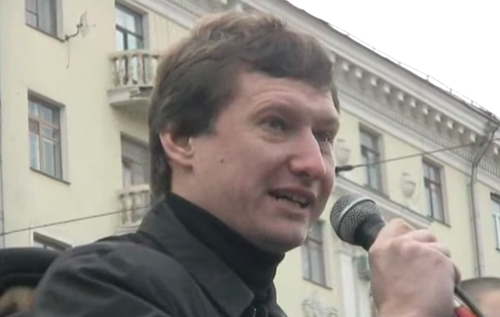The news broke: Russian human rights advocate and journalist killed in central Moscow. On 19 January 2009, Stanislav Markelov and Anastasia Baburova were shot by a Russian ultranationalist, Nikita Tikhonov. Markelov, a lawyer from Moscow, died at the scene. Baburova, an activist and journalist from Sevastopol who reported on Markelov’s work, died several hours later. As evidenced in the investigations and trials that followed, there was more to this tragic double murder than many western observers recognised at the time.
Eleven years on, 19 January is an important date for left-wing groups in Russia and Ukraine. Activists hold marches in memory of Markelov, Baburova and dozens of other people who have fallen victim to Neo-Nazi terror. But they also refer to issues that are often off-limits at other demonstrations. 19 January is one of the rare occasions where, particularly in Moscow, a whole range of groups — leftists, LGBT+, anti-racism campaigners, liberals, human rights activists, independent trade unionists, anarchists — come together to fill the streets with anti-militarist, anti-racist and anti-capitalist slogans for one day a year.

In the years before Markelov’s murder, the streets of Russia’s big cities became a battleground as ultra-nationalists took aim at two targets: Russia’s migrant workers and anti-fascist activists.
Protests, fights, murders and fabricated criminal cases flicked through headlines and news segments. “The moderate section of the nationalist movement has broken down,” Markelov said at a press conference after the murder of Alexey Krylov, a 21-year-old man who was killed on his way to an anti-fascist concert in 2008. “They have consciously gone underground… and are trying to provoke war itself.”
Following the Orange Revolution in Ukraine in 2004, Russia’s authorities set about “reordering” the political field (often with the help of water cannons and riot police). As part of this campaign, the Kremlin’s political technologists were attempting, in the words of Robert Horvath, to “manage” nationalism in their favour. This “project” involved striking often unclear deals with agile and flexible “non-governmental” networks in exchange for political patronage.
The investigation into the murder of Markelov and Baburova revealed that the end beneficiaries of Kremlin political technologists’ plans could be unpredictable. In the mid-2000s, Nikita Tikhonov and his accomplices in the revolutionary terror group BORN (Combat Organisation of Russian Nationalists) carried out 11 politically-motivated murders — migrant workers, anti-fascists, a federal judge being their targets. They also had deep connections to Russian Image, a magazine-turned-movement that aimed to rebrand far-right nationalism as intellectual and glamourous. In turn, Russian Image not only collaborated with pro-government youth organisations as it sought to out-position others in the competitive world of far-right activists. It also had connections in high-ranking Russian politics. With help from contacts in the police, they collected extensive personal information on Russian anti-fascists.
But while BORN and its competitors may have had their roots in the nexus of street-level and intellectual nationalism that began to emerge in Russia in the 1980s and 1990s, there was also a constellation of counter-movements developing, comprising environmental, social and political initiatives, that continued into the new decade and animated fresh protests under new conditions. It was in this milieu that Markelov, a Moscow law student, came of age politically in the long perestroika of the early 1990s — and perhaps where the pluralism of his political concerns was born. In the “October days” of 1993, Markelov served in a volunteer medical unit comprised of socialists and anarchists that patrolled the conflict zone which erupted in central Moscow as pro-government forces attacked the Supreme Soviet and the anti-Yeltsin movements. “He helped the wounded. Then he helped carry and load the dead,” Pyotr Ryabov, a Russian anarchist historian, recalled. “A real test for a 19-year-old boy.”
PrintThomas Rowley Giuliano Vivaldi | Radio Free (2020-01-17T23:00:00+00:00) To remember is to fight: the legacy of Russian activist lawyer Stanislav Markelov. Retrieved from https://www.radiofree.org/2020/01/17/to-remember-is-to-fight-the-legacy-of-russian-activist-lawyer-stanislav-markelov/
Please log in to upload a file.
There are no updates yet.
Click the Upload button above to add an update.